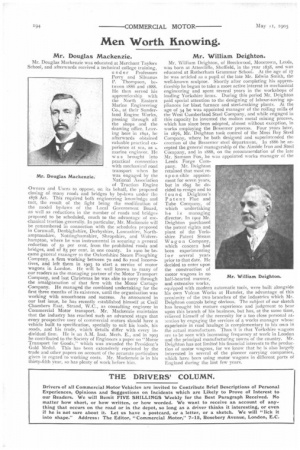Men Worth Knowing.
Page 22

If you've noticed an error in this article please click here to report it so we can fix it.
Mr. Douglas Mackenzie.
Mr. Douglas Mackenzie was educated at Merchant Taylors School, and afterwards received a technical college training, under Professors Perry and Silvanus 1'. Thompson, between i886 and 1888. He then served his apprenticeship with the North Eastern Marine Engineering Co., at their Sunderland Engine Works, passing through all the shops and the drawing office. Leaving here in 1891, he afterwards obtained valuable practical experience at sea, as a marine engineer. He was brought into Practical connection with mechanical road transport when he was engaged by the National Association of Traction Engine Owners and Users to oppose, on its behalf, the proposed closing of many roads and bridges by by-laws under the 1878 Act. This required both engineering knowledge and tact, the result of the fight being the modification of the model by-laws of the Local Government Board, as well as reductions in the number of roads and bridges proposed to be scheduled, much to the advantage of mechanical traction generally. In particular, Mr. Mackenzie will be remembered in connection with the schedules proposed in Cornwall, Denbighshire, Derbyshire, Lancashire, Northamptonshire, Nottinghamshire, Shropshire, and Wolverhampton, where he was instrumental in securing a general reduction of 50 per cent, from the prohibited roads and bridges, and of 85 per cent, in one county. In 1900 he became general manager to the Oxfordshire Steam Ploughing Company, a firm working between 7o and So road locomotives, and left them in 1903 to start a service of motor wagons in London. He will be well known to many of our readers as the managing partner of the Motor Transport Company, and last Christmas he was able to carry through the amalgamation of that firm with the Motor Cartage Company. He managed the combined undertaking for the first three months of its existence, until the organisation was working with smoothness and success. As announced in our last issue, he has recently established himself at Cecil Chambers East, Strand, W.C., as consulting engineer in Commercial Motor transport. Mr. Mackenzie maintains that the industry has reached such an advanced stage that every prospective user of commercial motors should have a vehicle built to specification, specially to suit his loads, his roads, and his trade, which details differ with every individual firm. He is an A.M. Inst, Mech. E., and in 1903 he contributed to the Society of Engineers a paper on "Motor Transport for Goods," which was awarded the President's Gold Medal. This has been extensively reprinted by the trade and other papers on account of the accurate particulars given in regard to working costs. Mr. Mackenzie is in his thirty-fifth year, so has plenty of work before him. Mr. Douglas Mackenzie.
Mr. William Deighton.
Mr. William Deighton, of Beechwood, Moot-town, Leeds, was born at Attercliffe, Sheffield, in the year 1838, and was educated at Rotherham Grammar School. At the age of 17 he was articled as a pupil of the late Mr. Edwin Smith, the well-known sculptor. Shortly after completing his apprenticeship he began to take a more active interest in mechanical engineering and spent several years in the workshops of leading Yorkshire firms. During this period Mr. Deighton paid special attention to the designing of labour-saving appliances for blast furnace and. steel-making plants. At the age of 34 he was appointed manager of the rolling miffs of the West Cumberland Steel Company, and while engaged in this capacity he invented the molten metal mixing process, which has since been adopted, almost without exception, in works employing the Bessemer process. Four years later, in 1876, Mr. Deighton took control of the Moss Bay Steel Company, where he both designed and superintended the erection of the Bessemer steel department. In 1886 he accepted the general rnanag-ership of the Ainside Iron and Steel Company, and in 1888, on the recommendation of the late Mr. Samson Fox, he was appointed works manager of the Leeds Forge Company. Mr_ Deighton retained that most respan sible appointment for seven years, but in 1895 he decided to resign and to f ound Deighton 's Paten t Flue and Tube Company, of which undertaking he is managing director. In 1902 Mr. Deighton purchased the patent rights and plant of the Yorkshire Patent Steam W n Company, which concern had been experimenting for several years prior to that date. He decided to enter upon the construction of motor wagons in no half-hearted manner, and extensive works, equipped with modern automatic tools, were built alongside his own Vulcan Works at Hunslet, the advantage of this proximity of the two branches of the industries which Mr. Deighton controls being obvious. The subject of our sketch has brought his mature experience and judgment to bear upon this branch of his business, but has, at the same time, relieved himself of the necessity for a too close personal ater-stion by engaging the services of a works manager whose experience in road haulage is complementary to his own in the actual manufacture. Thus it is that Yorkshire wagons are to be seen with increasing frequency at work in London and the principal manufacturing towns of the country. Mr. Deighton has not limited his financial interests to the production of motor wagons, for we know that he is also largely interested in several of the pioneer carrying companies, which have been using motor wagons in different parts of England during the last few years.
Mr. William Deighton.
























